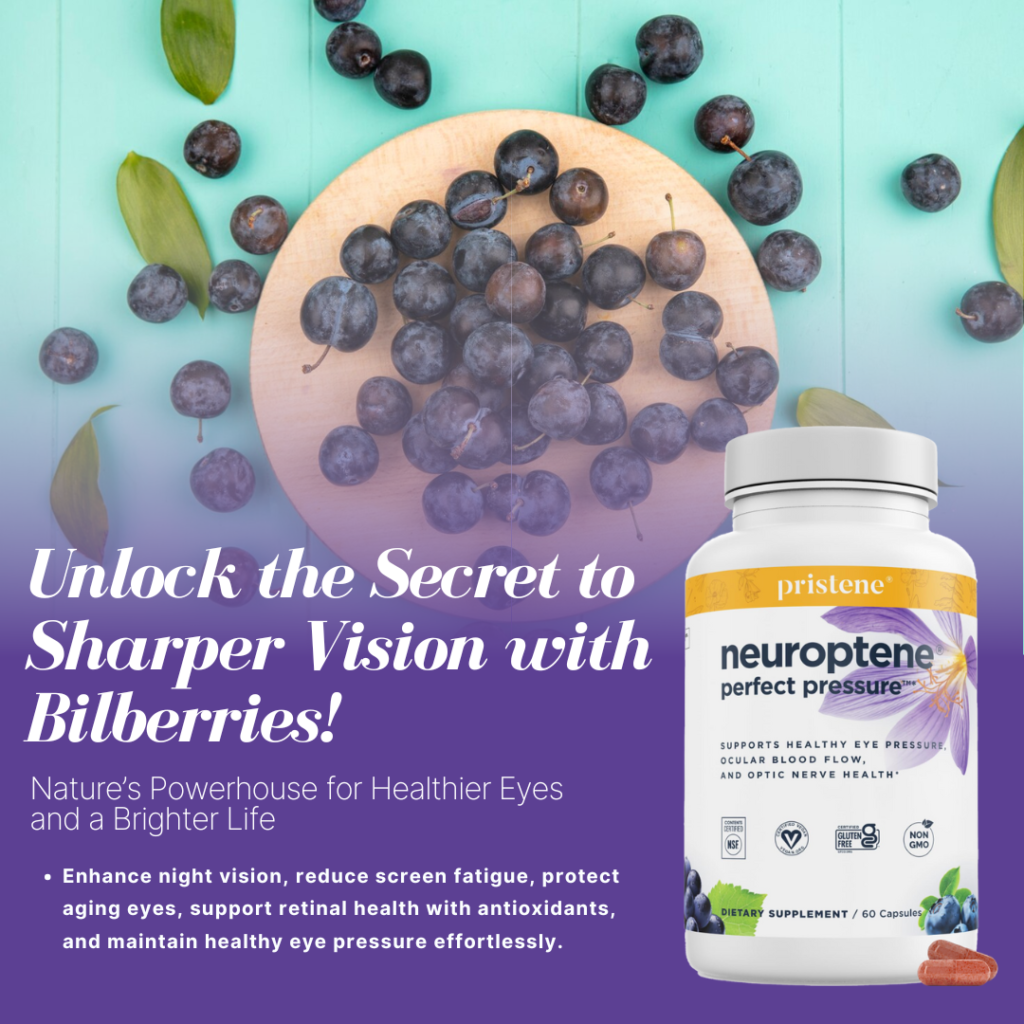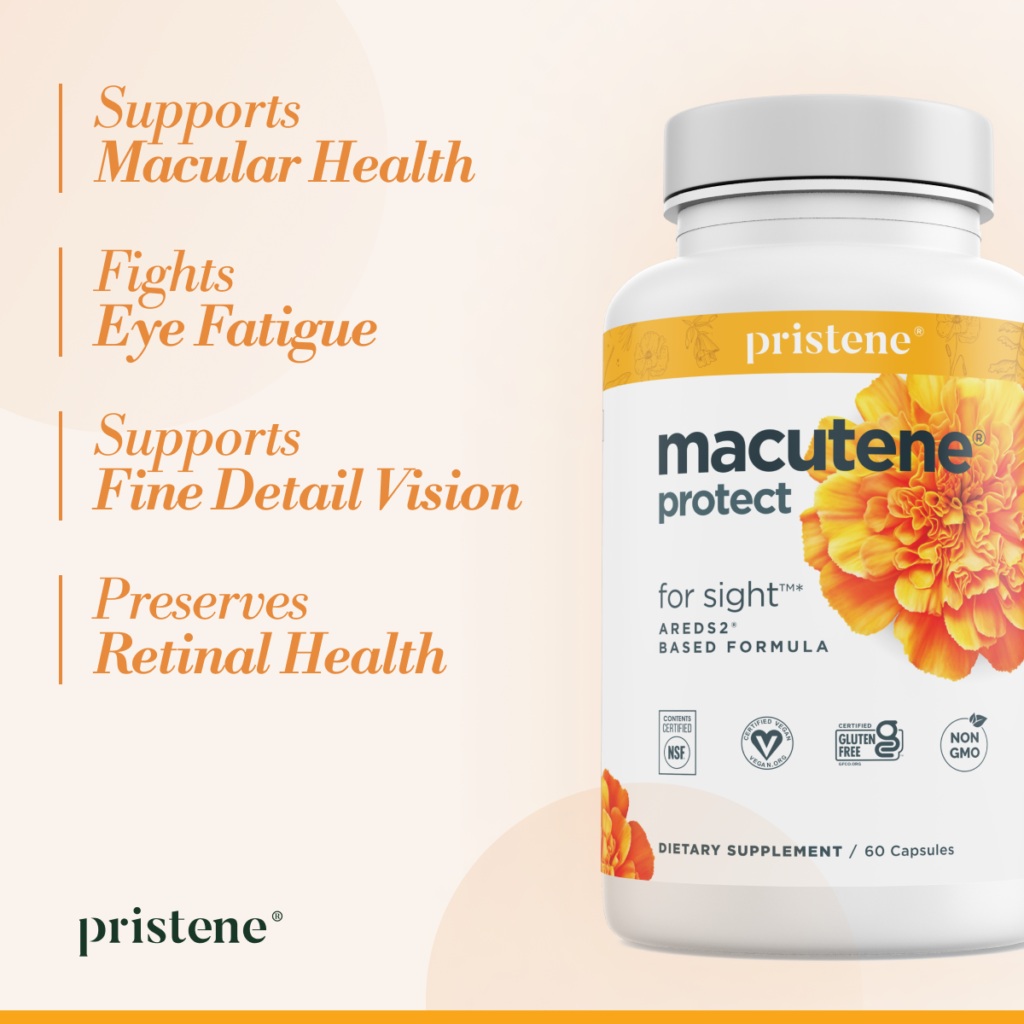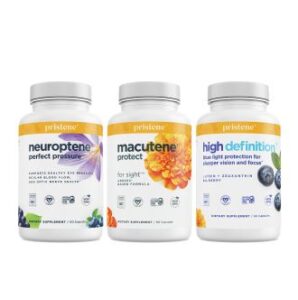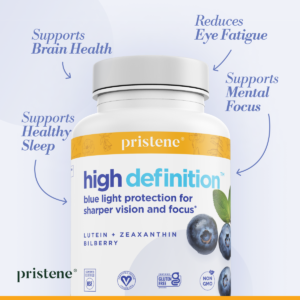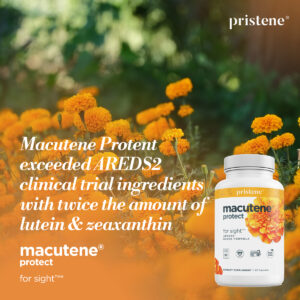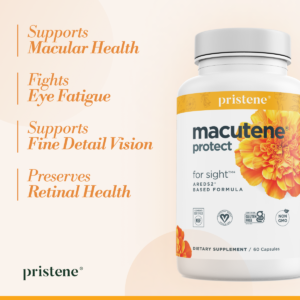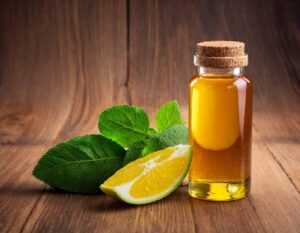When we think of berries with health benefits, blueberries often come to mind. However, there’s another powerful berry making waves in the world of health: the Bilberry. A close relative of the blueberry, this small, dark fruit is packed with nutrients and has been widely used for its medicinal properties, specifically for eye health.
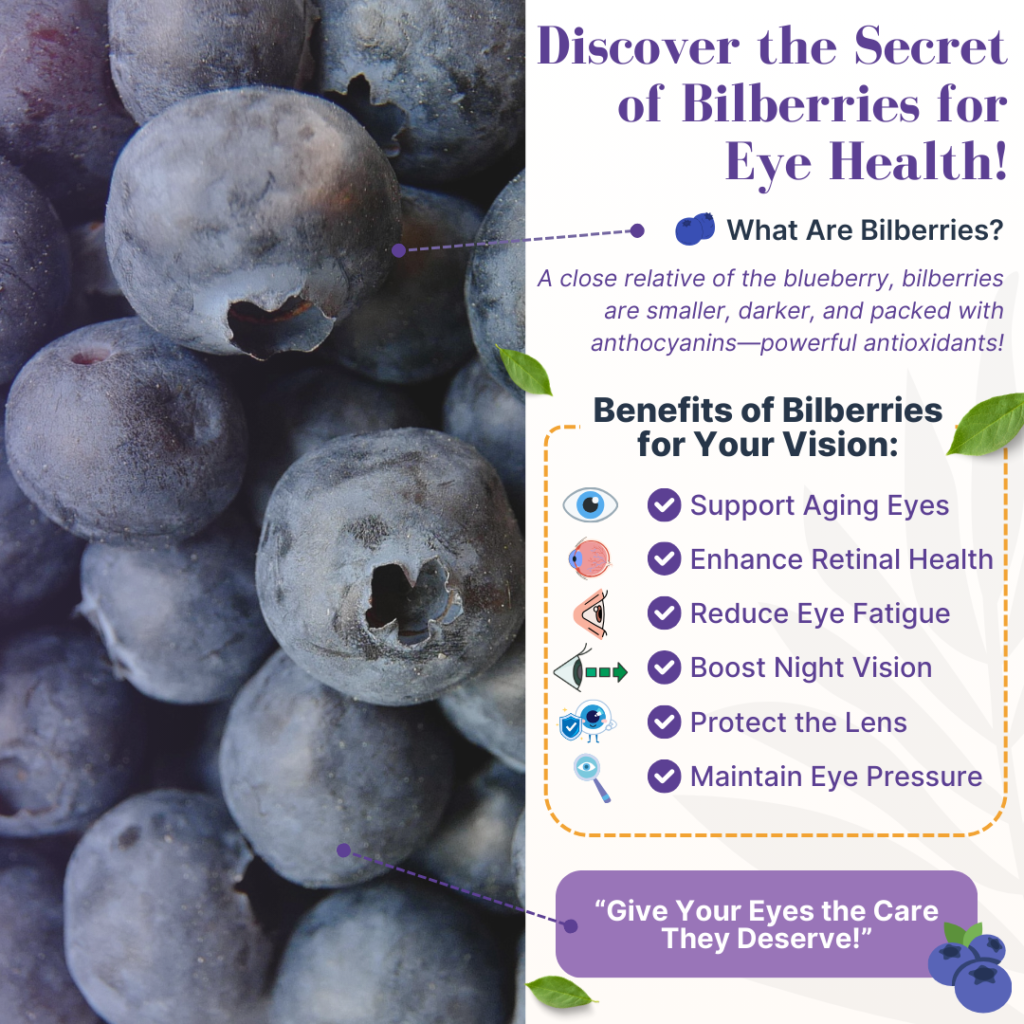
Bilberry vs. Blueberry: What’s the Difference?
While bilberries and blueberries may look similar, they’re distinct in several ways. Bilberries are generally smaller, darker, and contain more anthocyanins—compounds known for their antioxidant properties. Unlike blueberries, which are native to North America, bilberries are native to Europe. These anthocyanins give bilberries their deep blue-purple color and are responsible for many of the health benefits associated with the fruit.
Bilberries and the Royal Air Force – Benefits for Night Vision?
One popular story is that during World War II, British Royal Air Force (RAF) pilots consumed bilberries to improve their night vision, particularly for night bombing missions. The anecdote suggests that bilberries helped enhance visual acuity in low light or dark conditions.
However, the scientific evidence supporting this claim is somewhat limited. Some studies have investigated the potential of bilberries (and other similar berries rich in anthocyanins, a type of antioxidant) for improving vision, particularly night vision. Anthocyanins are thought to enhance retinal function and blood circulation in the eyes, theoretically leading to better visual performance in low light.
Even though there is no solid evidence in human studies that bilberry produces any positive visual effects on night vision there is some experimental evidence that implies it might be useful in some ocular conditions whose mode of action is oxidative stress. There are recent epidemiologic, molecular and genetic studies that show a major role of oxidative stress in age-related macular degeneration.
There have been some studies showing oxidative protective effects of bilberry in non-human models.
In Protective Effects of Bilberry and Lingonberry Extracts Against Blue-light Emitting Diode Light-induced Retinal Photoreceptor Cell Damage in Vitro, Ogawa et al showed that cultured mouse cells that had bilberry extract added before subjection to high-energy short-wavelength light survived better than those that hadn’t received the extract.
In Retinoprotective Effects of Bilberry Anthocyanins via Antioxidant, Anti-Inflammatory, and Anti-Apoptotic Mechanisms in a Visible Light-Induced Retinal Degeneration Model in Pigmented Rabbits, Wang et al found similarly improved survival of pigmented rabbit retinal cells when exposed to bilberry abstract prior to high-intensity light.
So, what are the benefits of bilberries for eyes and vision?
Bilberries have been studied extensively for their potential benefits to eye health, particularly in the context of aging. As mentioned, bilberries are rich in anthocyanins, which are powerful antioxidants believed to protect the eyes by reducing oxidative stress and improving blood circulation to the retina. Here are some ways bilberries may help the aging eye, though more research is needed to confirm these effects:
1. Helping Support the Aging Eye
Bilberries contain antioxidants that may help protect against the oxidative damage associated with the aging eye by protecting retinal cells from damage caused by free radicals.
2. Supporting Retinal Health
Anthocyanins in bilberries are thought to improve blood flow to the retina and strengthen the capillaries that supply the eyes, which may help preserve retinal function as we age. This could potentially help with supporting the aging eye by supporting blood circulation.
3. Enhancing Night Vision
Although the claims about World War II pilots using bilberries for night vision are debated, there is some evidence suggesting bilberry extracts may help improve contrast sensitivity and adapt to low-light conditions, which tend to deteriorate with age.
4. Reducing Eye Fatigue
Bilberries may help reduce symptoms of eye fatigue, which is particularly relevant in today’s digital age as people spend more time in front of screens. Some small studies have found that bilberry extract can reduce symptoms of eye strain and improve the comfort of the eyes, which could be useful for aging individuals experiencing discomfort from prolonged screen use.
5. Supporting the Human Lens
The lens in the human eye helps focus light onto the retina. Oxidative stress can play a major role in damage to the lens in the aging eye. Some research suggests that antioxidants like those found in bilberries may help reducing oxidative damage to the lens of the eye and help support the lens in the aging eye.
6. Maintaining Healthy Eye Pressures
Some studies suggest bilberry extracts may support eye health by helping to maintain healthy eye pressure which is important to help support the health of the optic nerve.
Why Pristene Formulations Include Bilberry
At Pristene, we are committed to using the most effective natural ingredients in our formulations, and bilberry is no exception. Its clinically studied potential benefits for vision health, coupled with its antioxidant properties, make it a standout ingredient in our products designed for supporting eye health. If you are looking to support your eyes or simply boost your intake of antioxidants, bilberry may be a powerful addition to your daily wellness routine. See our products Neuroptene Perfect Pressure and Macutene Protect.
Supporting Research
Bailey C, Day C. Traditional plants medicine as treatments for diabetes. Diabetes Care. 1989;12:553-564.
Bao L, Yao XS, Tsi D, Yau CC, CHia CS, Nagai H, Kurihara H. Protective effects of bilberry (Vaccinium myrtillus L.) extract on KBr03-induced kidney damage in mice. J Agric Food Chem. 2008;56(2):420-5.
Bell DR, Gochenaur K. Direct vasoactive and vasoprotective properties of anthocyanin-rich extracts. J Appl Physiol. 2006 Apr;100(4):1164-70.
Blumenthal M, Busse WR, Goldberg A, et al. The Complete German Commission E Monographs. Boston, MA: Integrative Medicine Communications; 1998.
Blumenthal M, Goldberg A, Brinckmann J. Herbal Medicine Expanded Commission E Monographs. Newton, MA: Integrative Medicine Communications; 2000:18-19.
Bomser J, Madhavi DL, Singletary K, et al. In vitro anti-cancer activity of fruit extracts from Vaccinium species. Planta Med. 1996;62:212-216.
Burdulis D, Ivanauskas L, Jakstas V, Janulis V. Analysis by anthocyanin content in bilberry (Vaccinium myrtillus L.) fruit crude drugs by high-performance liquid chromatography method. Medicina. 2007;43(7):568-74.
Cignarella A, Nastasi M, Cavalli E, et al. Novel lipid-lowering properties of Vaccinium myrtillus L. leaves, a traditional antidiabetic treatment, in several models of rat dyslipidaemia: a comparison with ciprofibrate. Thromb Res. 1996;84(5):311-322.
Granfeldt YE, Bjorck IM. A bilberry drink with fermented oatmeal decreases postprandial insulin demand in young healthy adults. Nutr J. 2011;10:57.
Gruenwald J, Brendler T, Jaenicke C, et al, eds. PDR for Herbal Medicines. 2nd ed. Montvale, NJ: Medical Economics Company Inc; 2000.
Head KA. Natural therapies for ocular disorders, part two: cataracts and glaucoma. Altern Med Rev. 2001;6(2):141-166.
Kolehmainen M, Mykkanen O, Kirjavainen PV, et al. Bilberries reduce low-grade inflammation in individuals with features of metabolic syndrome. Mol Nutr Food Res. 2012;56(10):1501-10.
Kramer JH. Anthocyanosides of Vaccinium myrtillus (bilberry) for night vision — a systematic review of placebo-controlled trials. Surv Ophthalmol. 2004 Nov-Dec;49(6):618.
Laplaud PM, Lelubre A, Chapman MJ. Antioxidant action of Vaccinium myrtillus extract on human low density lipoproteins in vitro: initial observations. Fundam Clin Pharmacol. 1997;11(1):35-40.
Logan AC, Wong C. Chronic fatigue syndrome: oxidative stress and dietary modifications. Altern Med Rev. 2001;6(5):450-459.
Magistretti NJ, Conti M, Cristini A. Antiulcer activity of an anthocyanidin from Vaccinium myrtillus. Arzneim-Forsch. 1988;38:686-690.
Maatta-Riihinen KR, Kahkonen MP, Torronen AR, et al. Catechins and procyanidins in berries of vaccinium species and their antioxidant activity. J Agric Food Chem. 2005 Nov 2;53(22):8485-91.
Muth ER, Laurent JM, Jasper P. The effect of bilberry nutritional supplementation on night visual acuity and contrast sensitivity. Altern Med Rev. 2000;5(2):164-173.
Norred CL, Finlayson CA. Hemorrhage after the preoperative use of complementary and alternative medicines. AANA J. 2000;68(3):217-220.
Puupponen-Pimia R, Nohynek L, Ammann S, Oksman-Caldentey KM, Buchert J. Enzyme-assisted processing increases antimicrobial and antioxidant activity of bilberry. J Agric Food Chem. 2008;56(3):681-8.
Rakel: Integrative Medicine. 3rd ed. St. Louis, MO: Elsevier Saunders. 2012.
Schulz V, Hansel R, Tyler VF. Rational Phytotherapy. Berlin, Germany: Springer-Verlag; 1998:193.
Sehitoglu MH, Farooqi AA, Qureshi MZ, Butt G, Aras A. Anthocyanins: targeting of signaling networks in cancer cells. Asian Pac J Cancer Prev. 2014;15(5):2379-81.
Torronen R, Sarkkinen E, Tapola N, Hautaniemi E, Kilpi K, Niskanen L. Berries modify the postprandial plasma glucose response to sucrose in healthy subjects. Br J Nutr. 2010;103(8):1094-7.
Vepsalainen S, Koivisto H, Pekkarinen E, et al. Anthocyanin-enriched bilberry and blackcurrant extracts modulate amyloid precursor protein processing and alleviate behavioral abnormalities in the APP/PS1 mouse model of Alzheimer’s disease. J Nutr Biochem. 2013; 24(1):360-70.

